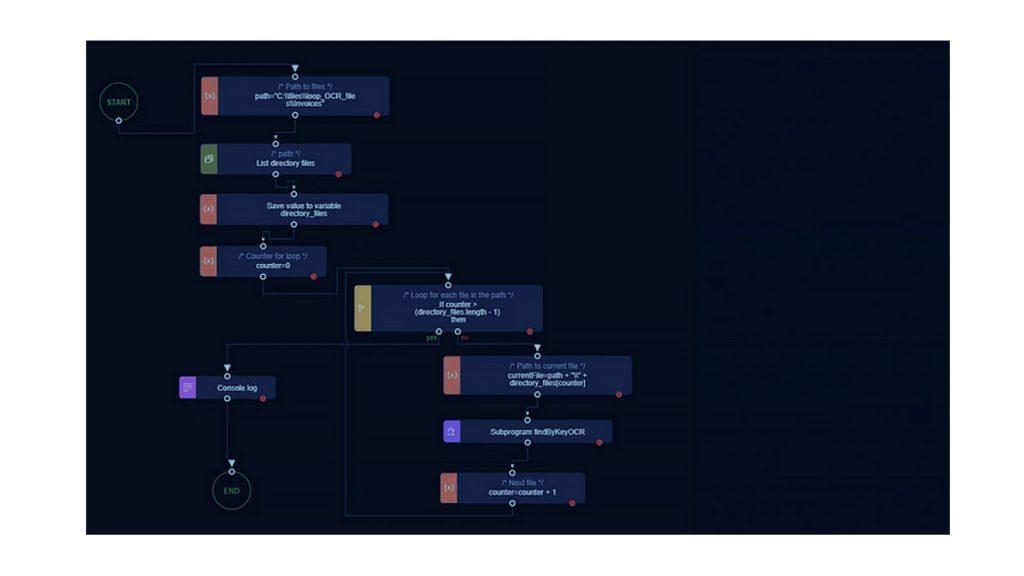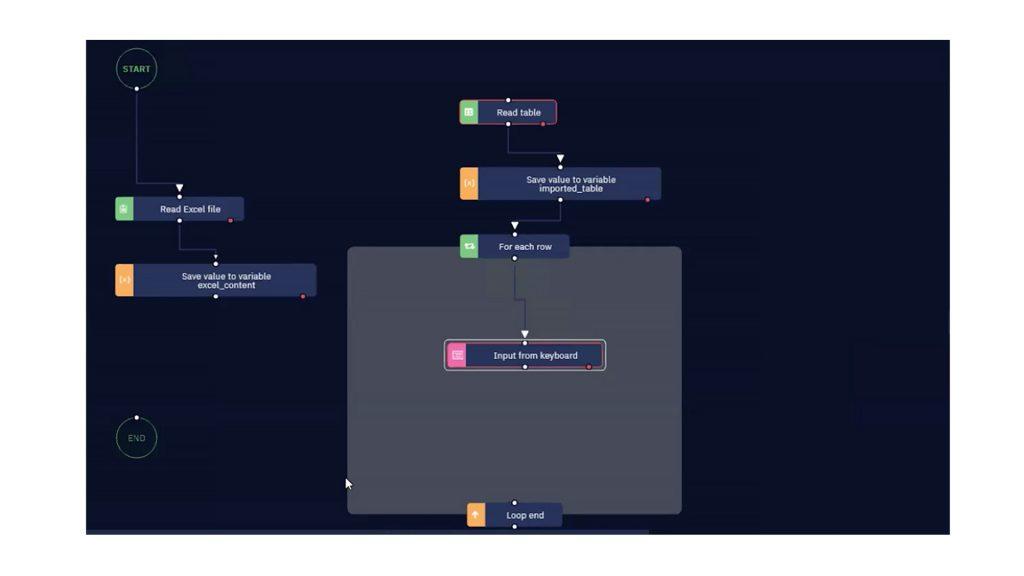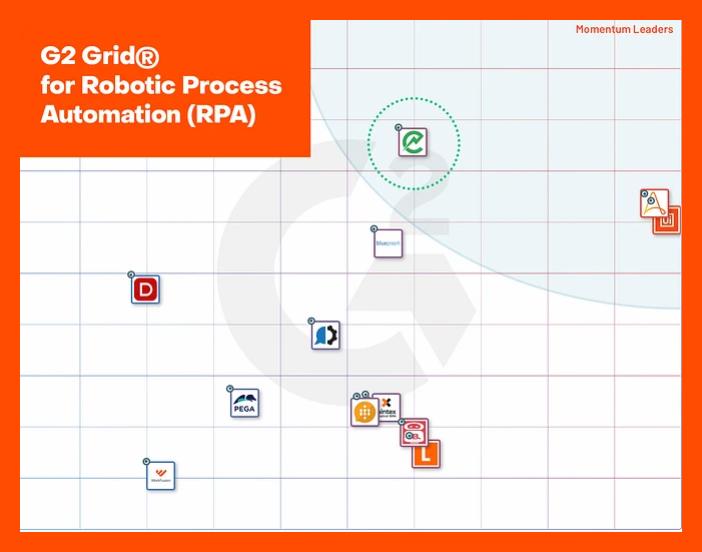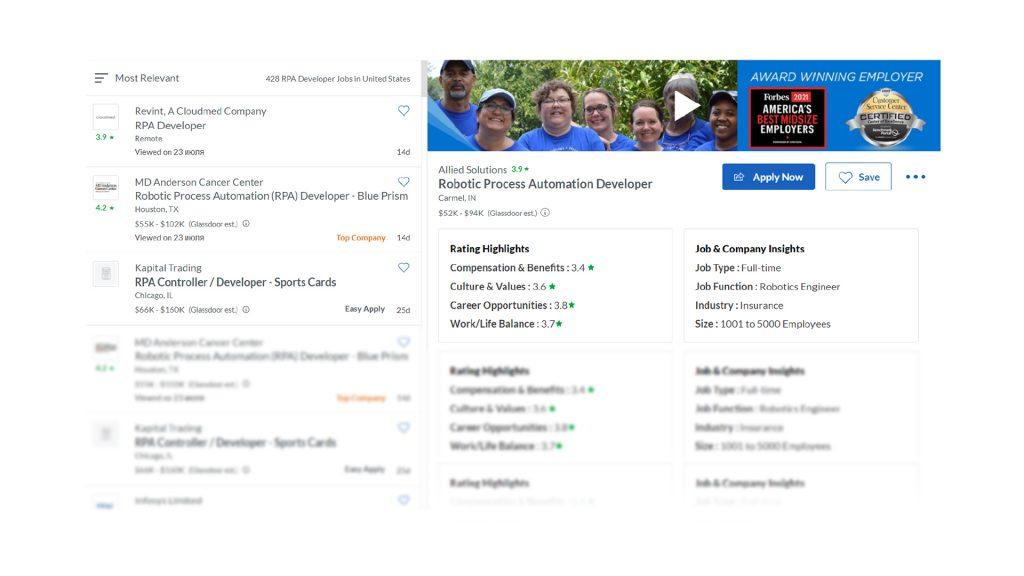UPDATED: January 2024
Forrester experts predict that by 2025, the RPA market will reach $22 billion. While there are plenty of benefits that RPA brings to the table, the trend towards automation creates one more opportunity: a chance to become a highly employable RPA developer.
In this article, we will define Robotic Process Automation technology, take a closer look at the RPA developer profession, determine the necessary skillset, and guide you on the first steps toward a career in RPA.
What is RPA?
Robotic Process Automation, or RPA, is a technology that is used to automate routine tasks performed manually by employees in desktop or browser applications. Using RPA, businesses cut down on costs, while employees become more efficient and can focus on tasks where creativity and human touch are essential.
RPA tools have many use cases in diverse industries. They’re popular in finance, human resources, and insurance, where there are lots of operational tasks and repetitive paperwork-based activities. RPA bots, for example, can read incoming requests, sort them, and input the data into different company systems, such as a CRM or an ordinary spreadsheet.

AI, ML, RPA: What's the Difference?
Sometimes, RPA is confused with Artificial Intelligence or Machine Learning. Although one can see elements of both in RPA, Robotic Process Automation is a rule-based technology, where bots are guided by pre-set instructions. Here’s what a basic automation flow might look like:
- To get started, you need to deploy an RPA development environment.
- Based on the tasks you need to execute within the workflow, you simply drag and drop blocks.
- To execute tasks, the bot follows instructions represented by graphic blocks that contain specific actions.
- The blocks, connected by arrows, build the logic of the processes.
- After the logic is built, you can save it and launch it on your computer. Bots will do the manual work for you.

Various RPA tools have different learning curves, and different tasks might require a different level of technical knowledge. For example, ElectroNeek Studio Pro, as you can see from the screenshot above, is easy to learn and allows even a non-technician to build efficient bots for simple to complex repetitive tasks.
Still, some sophisticated tasks might require programming skills, and this is where we step into the RPA developer’s wheelhouse.
What do RPA developers do?
To put it simply, an RPA developer is a professional in your team who works with both business analysts and operational managers to optimize business processes. Responsibilities include:
- Building a set of requirements for establishing a process tailored to specific business needs;
- Designing, developing, and testing automated workflows;
- Deploying RPA components, such as development tools, bots, code repositories, and logging tools;
- Supporting RPA project implementation and integration;
- Maintaining testing and bug fixing during the launch and deployment of bots.
- Interacting with Scrum masters, as well as business and QA analysts to identify and implement initiatives for improving business processes.
Depending on the company’s field, an RPA developer may execute these functions either for the company’s inner automation initiatives as its employee or for external clients by being a part of an RPA and business process consulting company.
According to the latest ZipRecruiter research, the average annual salary of an RPA developer in the US ranges from $61,500 to $155,000.
An example of an RPA developer’s task
Let’s observe an example of a process that can be automated with the help of ElectroNeek AI RPA bots.
Challenge:
To create a weekly performance report, a legal firm’s marketing manager logs into their task management system and collects the data on all the tasks executed by the team members one by one. Once the information is collected and structured, the manager creates the report. They have to spend hours on this routine every week, which results in lower productivity.
Solution:
To increase the manager’s productivity, the firm decides to hire an RPA developer and implement automation.
Here’s how it goes.
First of all, the RPA developer analyzes the company’s infrastructure and documents a set of requirements for building an automated process.
Second, the developer needs to build the logic for a bot. To do that, they need to make a list of all the activities the manager used to perform to create reports and establish a set of commands that will guide the bot to do the same things:
- Log into the task management system by using the manager’s credentials.
- Go to the Team Tasks section.
- Select a relevant team member’s board and copy the information on the tasks and their statuses.
- Open a new Excel file and insert the information in the proper column containing a team member’s name.
- Go back to the task manager and repeat the algorithm for other team members’ boards.
- Once all the team members’ boards are processed, end the activity.
When the bot logic is built, the RPA developer tests the automated workflow, executes bug fixing (if necessary), and deploys bots in the production environment. After the launch, they also perform ongoing maintenance and support.

The roles of RPA developers
While “RPA developer” is a general term used to describe an RPA professional, there are various other titles related to RPA, which may differ according to the actual duties of the professional. Let’s have a look at the most common of them.
RPA Solution Architect
Enables the RPA solution to be implemented, and analyzes the initial infrastructure of the environments and other bots’ deployment requirements.
RPA Administrator
Administers and supports existing automation processes and initiates change implementation as part of the administration process.
RPA Consultant
Helps businesses to plan, design, configure, test, and launch automation projects.
RPA Engineer
Designs, implements, and tests bots based on the requirements of the business within automation initiatives.
RPA Business Analyst
Analyzes business opportunities for automation, works closely with teams to identify requirements, and performs functional and process design of the automated solution.
As you can see, the RPA developer profession implies a diverse set of activities and functions depending on a specific organization’s needs. Often, the functions described above can be combined and executed within a single role in a company.
The skill set of an RPA developer
Although there are various RPA-related positions in the market, and each role has its specific skill set requirements, there are some common skills that any RPA expert is recommended to have to be considered for the best RPA positions.
What robotic process automation skills are required to become an ideal RPA developer?
- Programming capabilities: Java, .NET, C, or C++
- Specific mindset: an algorithmic and structured way of thinking
- Knowledge of database query language: SQL
- Good command of scripting languages: HTML and JavaScript
- Understanding of the basics of Artificial Intelligence and Machine Learning
Though the skills listed above may stand as a guarantee of the ideal RPA job candidate, you don’t have to have them all to become an RPA developer. Typically, a basic knowledge of one of the popular programming languages, such as JavaScript or Python, will be enough to begin your career in RPA.
By working with various CRMs, ERPs, and programming and database query languages, you can grow your expertise and challenge yourself by taking new roles, such as RPA Solution Architect, Business Analyst, or a traditional Developer role, and work with more complex projects.
How to become an RPA developer
So, you decided to become an RPA developer. What program do you need to learn, which RPA tools to master, and which training courses to take? What kind of programming skills are needed? Here are some ideas on where you can get started.
Explore existing RPA platforms and choose a primary one
While the basic principles are similar for all RPA tools, it still might be a good idea to select a primary platform to learn RPA and master your developer skills. The easiest way to do that is to go to popular software listings, such as G2, make a shortlist of the leading RPA tools, and explore their requirements.

For starters, you can consider RPA industry leaders according to G2: ElectroNeek, UIPath, and Automation Anywhere.
When evaluating RPA tools, you need to pay attention to what programming language is used behind the platform’s interface. Sooner or later, all RPA developers have to grapple with complex and nuanced processes. That’s why you need to be able to customize your bots with a bit of coding. Or at least, it should be easy for you to learn your chosen platform’s underlying programming language. For example, if you decide to use ElectroNeek, a basic knowledge of JavaScript will be a plus.
Learn RPA theory
Reading books to some of us may seem a bit old-school, but still, it’s an easy way to learn more about the RPA field and become a better RPA developer. We’ve prepared a small collection of the most popular editions available on Amazon:
- Automate This: How Algorithms Came to Rule Our World, Christopher Steiner
- The Robotic Process Automation Handbook: A Guide to Implementing RPA Systems, Tom Taulli
- The Care and Feeding of Bots: An Owner’s Manual for Robotic Process Automation, Christopher Surdak JD
- INTELLIGENT AUTOMATION: Learn how to harness Artificial Intelligence to boost business & make our world more human, Pascal Bornet, Ian Barkin, Jochen Wirtz
Learn RPA by doing it
The good news is that most RPA providers are interested in attracting as many RPA developers as possible. For this reason, they often offer free training courses and other educational materials to help you along the way.
For example, there’s ElectroNeek Academy, a quality interactive RPA learning environment. It provides courses elaborated by leading RPA experts for users from beginner to advanced, as well as an RPA certification.
Getting employed as an RPA developer

So, what kind of companies are looking for RPA developers? There are three main employment opportunities:
RPA vendors
First of all, RPA developers are in demand by companies that develop AI RPA tools. This is because such companies often provide extended customer support and help their users create bots and streamline processes.
Managed service providers and implementation partners of RPA vendors
RPA integrators, MSPs, and all kinds of RPA consultants offer their professional services to other companies. Since RPA is still an emerging industry and there aren’t that many RPA vendors on the market, that makes RPA integrators the major employer of RPA developers.
End users of RPA
Companies using RPA to automate their processes also rely on RPA developers. While each particular company interested in automation usually doesn’t hire a lot, the demand for such professionals on the market is only increasing.
The bottom line
In this article, we’ve defined robotic process automation technology, take a closer look at the RPA developer job, outlined the skillset you need to have to obtain the ideal RPA job, and provided you with guidance on your first steps in learning RPA. We hope our article has removed any doubts you may have had regarding a career in RPA.
If you’ve already made up your mind, feel free to start your journey with ElectroNeek. By choosing ElectroNeek as your first step in automation, you get the opportunity to learn RPA from scratch, even with zero programming skills. It’s an easy-to-learn and easy-to-use RPA platform that allows even non-experts to build and deploy their automated workflows in a no-code/low-code environment.
